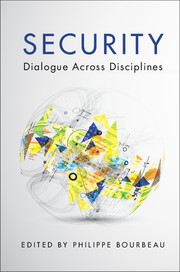Book contents
- Frontmatter
- Contents
- Notes on contributors
- Acknowledgments
- 1 A multidisciplinary dialogue on security
- 2 Philosophy: The concepts of security, fear, liberty, and the state
- 3 Anthropology/ies: Moving beyond disciplinary approaches to security
- 4 Geography: Securing places and spaces of securitization
- 5 Sociology: Security and insecurities
- 6 International relations: Celebrating eclectic dynamism in security studies
- 7 Psychology: The phenomenology of human security
- 8 International political economy: Conceptual affinities and substantive differences with security studies
- 9 Criminology: Reimagining Security
- 10 International law: Between legalism and securitization
- References
- Index
6 - International relations: Celebrating eclectic dynamism in security studies
Published online by Cambridge University Press: 05 December 2015
- Frontmatter
- Contents
- Notes on contributors
- Acknowledgments
- 1 A multidisciplinary dialogue on security
- 2 Philosophy: The concepts of security, fear, liberty, and the state
- 3 Anthropology/ies: Moving beyond disciplinary approaches to security
- 4 Geography: Securing places and spaces of securitization
- 5 Sociology: Security and insecurities
- 6 International relations: Celebrating eclectic dynamism in security studies
- 7 Psychology: The phenomenology of human security
- 8 International political economy: Conceptual affinities and substantive differences with security studies
- 9 Criminology: Reimagining Security
- 10 International law: Between legalism and securitization
- References
- Index
Summary
While security is hardly discussed in philosophy (as Jonathan Herington, this volume, points out) and while theories of security are politely neglected in law (as Wouter Werner, this volume, shows), it is the preeminent concept in international relations. Courses on security studies are taught in almost all undergraduate/graduate programs in international relations around the globe. There is at least one security specialist (and often, many more) in almost all departments of political science and international studies in North America, Europe, and Asia. Security is the primary focus of no fewer than four major journals in the field – International Security, Security Dialogue, Journal of Conflict Resolution, and Security Studies – and this list is expanding, with the newly created Critical Studies on Security (2013), the European Journal of International Security (2016), and the Journal of Global Security (2016). In the top twelve journals in international relations according to the 2012 Thompson Reuters Citation Journal Report, four are security-related journals. In short, security studies is a massive field of research in international relations.
In the past decades, debates surrounding security studies have evolved through several interrelated turns. Security has been structured, systemized, broadened, deepened, gendered, humanized, constructed, and privatized. Theoretical and empirical studies detailing the contours and the importance of each of these approaches to security abound in specialized journals. In this chapter, we want to celebrate this eclectic dynamism. Through our discussion, we will show that the diversification of referent objects, approaches, and research methods is a crucial vector in the development and relevance of security studies.
Scholars have organized and reviewed this immense field of study in several ways. Some of the most influential reviews address how the various international relations approaches understand security (Williams 2013), how they distinguish between types of security (Collins 2013), and what are the security problematics (Baldwin 1997). Still others tackle the evolution of international security studies as a field of research (Buzan and Hansen 2009). Although the discussion we offer in this chapter will necessarily be influenced by these important contributions, we have a different set of objectives here.
- Type
- Chapter
- Information
- SecurityDialogue across Disciplines, pp. 111 - 136Publisher: Cambridge University PressPrint publication year: 2015
- 6
- Cited by

